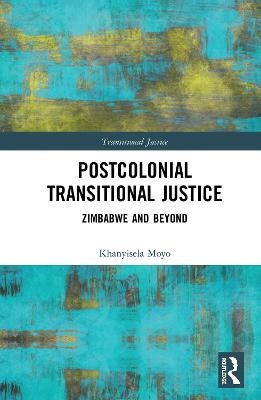
Postcolonial Transitional Justice
Routledge (Verlag)
978-1-138-48574-7 (ISBN)
This book contributes to a deeper understanding of transitional justice by examining the complexities of transition in postcolonial societies. It focuses particularly on Zimbabwe but draws on relevant comparative material from other postcolonial polities. Examples include but are not limited to African countries such as South Africa, Rwanda and Mozambique. European societies such as Northern Ireland, as well as other nations such as Guatemala, are also considered. While amplifying the breadth of the subject of transitional justice, the book addresses the claim that transitional justice mechanisms in postcolonial countries are necessary if the rule of law and the credibility of the country’s legal institutions are to be restored. Drawing on postcolonial legal theory, and especially on analyses of the relationship between international law and imperialism, the book challenges the assumption that a domestic rule of law ‘deficit’ may be remedied with recourse to international law. Taking up the paradigmatic perception that international law is neutral and has fixed rules, it demonstrates how complex issues which arise during postcolonial transitions require a more critical adoption of transitional justice mechanisms.
Khanyisela Moyo is based at the School of Law/Transitional Justice Institute, University of Ulster, Northern Ireland.
Contents
Acknowledgements
1. INTRODUCTION
1.1 Postcolonial transitional justice
1.2 Zimbabwe
1.3 Outline of the book
2. BASIC CONCEPTS OF THE STUDY AND A POSTCOLONIAL CRITIQUE
2.1 Introduction
2.2 The Field of Transitional Justice
2.3 The ‘Justice’ part of ‘Transitional Justice’
2.4 Locating the Critical Areas of the Research within the Transitional Justice Field
2.5 Critique, Transitional Justice and Postcolonial Theory
3. RULE OF LAW AND JUDICIAL INDEPENDENCE
3.1 Introduction
3.2 Normative Framework
3.3 Rule of Law and Judicial Independence in Transitions
3.4 The Postcolonial Context
3.5 Zimbabwe: The Rule of Law and Judicial Independence
3.6 How to Read Zimbabwe’s Experience with Rule of Law and Judicial Independence
3.7 Insights from Other Postcolonial Polities
3.8 Conclusion
4. LAND REFORM AND TRANSITIONAL JUSTICE
4.1 Introduction
4. 2 Land Reform and Transitional Justice
4. 3 Zimbabwe: A Case Study
4.4 The Limits of International Law: How to Read Zimbabwe’s Experience with Land Reform
4.5 Insights from Other Postcolonial Polities
4.6 Conclusion
5. MINORITIES IN POSTCOLONIAL TRANSITIONS
5.1 Introduction
5.2 Minorities and Transitional Justice
5.3 The Distinctive Features of Postcolonial Transitional Minority Questions
5.4 The Story of the Ndebele of Zimbabwe
5.5 How to Read Zimbabwe’s Experience with the Ndebele Question
5.6 Postcolonial Agency in Transitions
5.7 Conclusion
6 DEALING WITH THE LEGACY OF IMPUNITY
6.1 Introduction
6.2 Zimbabwe: The Context
6. 3 How to Read Zimbabwe’s Legacy of Impunity
6.4 Insights from Other Postcolonial Polities
6.5 Conclusion
7. CONCLUSION
7.1 Overview and Contribution to Transitional Justice
7.2 The Definitional Issue
7.3 The Limitations of International Law
7.4 Hybridity
7.5 Further Research
Bibliography
Table of cases
Table of statutes
Table of regulations, treaties, international resolutions and key reports
Index
| Erscheinungsdatum | 18.06.2019 |
|---|---|
| Reihe/Serie | Transitional Justice |
| Verlagsort | London |
| Sprache | englisch |
| Maße | 156 x 234 mm |
| Gewicht | 453 g |
| Themenwelt | Geisteswissenschaften ► Sprach- / Literaturwissenschaft ► Anglistik / Amerikanistik |
| Geisteswissenschaften ► Sprach- / Literaturwissenschaft ► Literaturwissenschaft | |
| Naturwissenschaften ► Geowissenschaften ► Geografie / Kartografie | |
| Recht / Steuern ► Allgemeines / Lexika | |
| Recht / Steuern ► EU / Internationales Recht | |
| Recht / Steuern ► Strafrecht ► Strafverfahrensrecht | |
| Sozialwissenschaften ► Politik / Verwaltung | |
| Sozialwissenschaften ► Soziologie ► Spezielle Soziologien | |
| ISBN-10 | 1-138-48574-8 / 1138485748 |
| ISBN-13 | 978-1-138-48574-7 / 9781138485747 |
| Zustand | Neuware |
| Haben Sie eine Frage zum Produkt? |
aus dem Bereich


